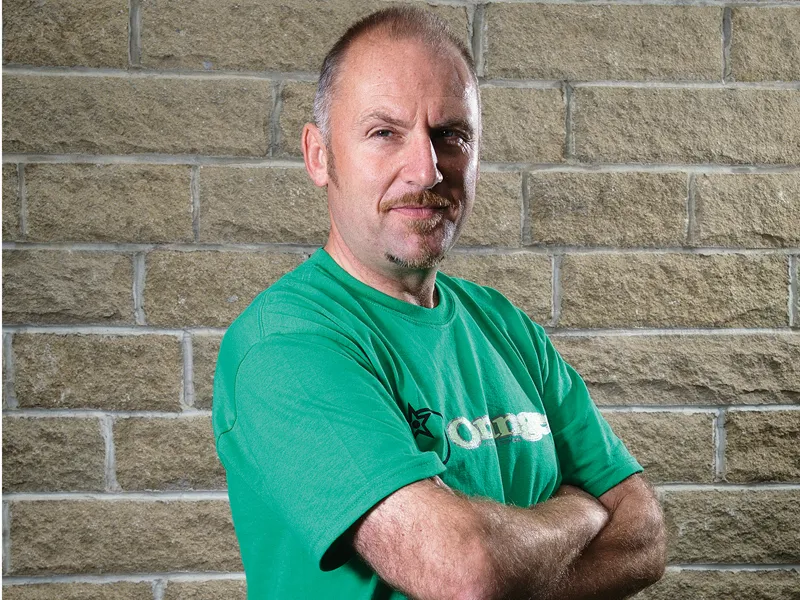Business partners Lester Noble and Steve Wade are the men behind Yorkshire-based mountain bike brand Orange. While their products are known worldwide and they've sponsored two world champions, the men behind the brand are barely known at all.
Neither of them like the limelight, so it was a pleasant surprise when Lester agreed to be interviewed. We met up on the edge of the Yorkshire moors, with hills all around and the sea looking in the windows – a relaxing place for him to talk about life, the universe, bicycles and everything.
BikeRadar: Are you still enjoying riding as much as you ever did?
Lester Noble: I am now. The Whinlatter trail recently opened up about 10 miles away from my house. It looks down over Derwentwater, under the shadow of Skiddaw. I started riding it a couple of months ago and got all my mates involved. I’m probably riding more now than I’ve ever done.
Orange has a big name, but it’s true to say it’s a small company... It’s a tight unit. We made in the order of 5,000 bikes last year, which was a good year for us.
Not that long ago, Orange had Greg Minnaar and Steve Peat on board – two World Cup champions, one a world champ. It was a hugely visible brand worldwide and you could have gone very big. Why didn’t you?
You’ve got to understand that we fell into sponsoring world champions through sheer luck, not through a business expansion strategy with a budget to back it up. Global Racing set up as a big team but their bike deal fell through. Greg Minnaar had been riding for Animal/Orange. He took his downhill bike along and the team chose to ride Orange.
They came to us and it didn’t cost us anything. In fact they allocated some money to us to help develop bikes for them, which was a big help. So we were getting a special team for very little cost. Having said that, it was an extra bonus when Greg overhauled Nico in the final round to claim the World Cup.
Then Steve Peat came to us because his GT deal fell through and he wanted to go on his own with his side sponsors. A local British brand appealed to him. It was another thing that fell easy for us. But when Peaty got headhunted by Santa Cruz, we couldn’t compete.
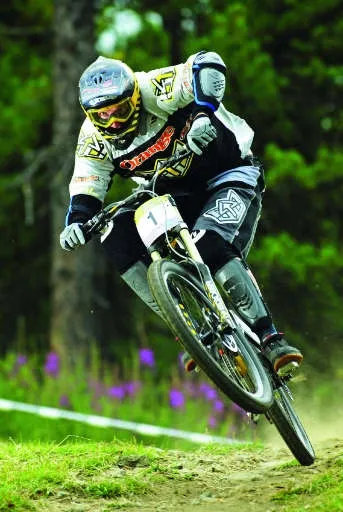
Steve Peat rode for Orange between 2002 and 2005
Were you ever tempted to get the venture capitalists in and make Orange big?
I’m not a businessman and it’s a reflection on where I’ve come from that the idea of borrowing a lot of money to create this big thing scares me. Steve is far more switched onto that side of things, but I think, equally, he likes the idea that we are in control.
It did cross our minds to start producing bikes in the Far East but we decided against it for everything except our cheap G2 and G3 hardtails. All our suspension frames are made in Yorkshire and we will be bringing more of the hardtails in house too.
It’s company policy really, to make things here?
Yes. Apart from anything else, Steve’s sheet metal business has been key to Orange and he has employees to consider. It’s a family business. His nephew, Ashley, runs it now.
And Steve spends all his time riding bikes?
He rides bikes more than anyone I know. Maybe the pro cross-country racers do more but I doubt the downhillers do. He’s out every day. He just loves riding. He’s become more and more extreme but still labels it cross-country.
Are you similar people?
We both have the same ideals I think, but Steve is one of these people who is very firm in his mind and can’t be swayed easily. Our designs wouldn’t have been as successful if he hadn’t been like that. Because of Steve, we never got caught up in the fashion side of the sport. So he kept it simple with the single pivot and so on... Yes he always believed in the single pivot and it really came into its own when platform shock technology came in and negated the benefits of multi-pivots.
Which Orange bikes are you proudest of?
The Patriot, I suppose, that was the start of what we are today. It was made for the Animal/Orange Team to ride British downhill courses and ushered in two advances – the 222 downhill bike, which made us a bit of a name abroad, and the Sub 5, which was our first really successful full-suspension cross-country machine, even more so when the Manitou platform shock was launched.
I’m also proud of the way we’ve learned to heat-treat 6000 series aluminium so that our frames end up as one complete unit, as opposed to a lot of bits welded together. It makes such a difference.
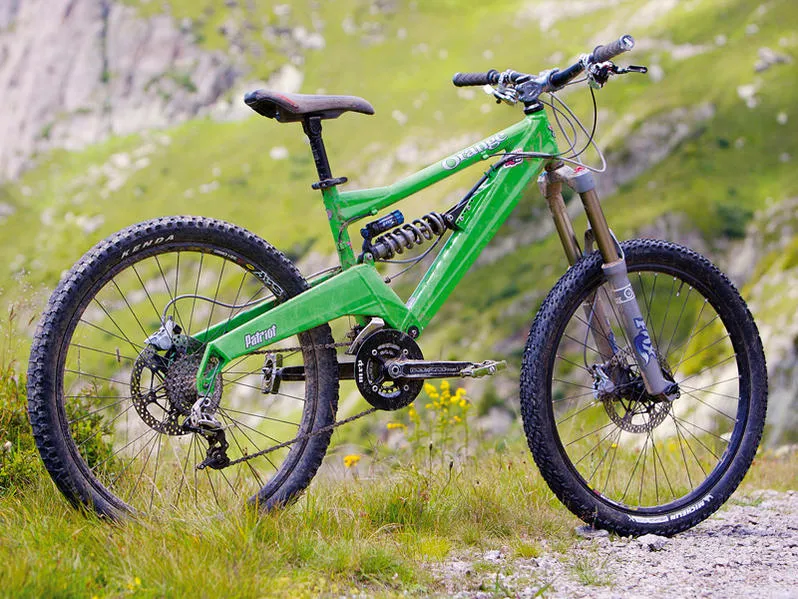
Orange's Patriot started off as a UK downhill bike and evolved into a trail-hungry classic
What’s your role at Orange?
No one at Orange gets labelled with one role, because we are a small company and we are all multi-tasking. Our staff are our strength, particularly now some younger people have come up, and I think the most useful thing I do is listen to their ideas and help make the best ones happen.
Steve and I are aware that we’re old fogies, and though we can still ride with the youngsters, Steve in particular, I think the young guys are the future. You could say I’m a facilitator.
You were into sailing before bikes. When did that start?
As a kid. My dad worked in the Shildon engineering works near Darlington. He was very traditional in some ways, he was the only one who worked and mum looked after the house, but he never drank alcohol or smoked, like all my friends’ parents did.
He was one of those people who always wanted to get away somewhere at the weekend, usually near water. We started with dinghies and, from the age of nine, I was in Ullswater every weekend, sailing, from March till October.
Were you destined for the engineering works too?
I was fortunate enough to get into grammar school and the automatic thing was to go on to A-levels. I didn’t do that well in the exams, but I did OK and I came out thinking 'what do I do now?' I just wanted to go sailing. I went to teacher training college in Teesside. But I only did that for two years. And then a job came up working in a sail loft with Roger Tushingham, designing sails, which is what I wanted to do anyway.
We were doing dinghy sails and then we got into windsurf sails, which influenced my future. Windsurfing was just taking off... It was becoming a big sport in the UK and there was a company called Ultrasport in Nottingham who made a range of boards called the Sea Panther. They came to us and we did them 10 sails that got Top 10 in the Nationals. That got us in. They loaned us a board each and I really got into it.
I was national champion through the early 80s, European champion in 1982 but only sixth in the 1983 Worlds. That was in what was then called the Open Class – I sailed the Mistral M1. Which led to mountain biking...
Because around 1983 windsurfing got more into the high-wind sailing. You went to events with a 15-knot minimum, which meant you spent most of the time sitting on the shore doing nothing. We were looking for something to help us keep fit. We saw these bikes with knobbly tyres and we thought it looked great. So we got a couple of Muddy Foxes and I got into that too.
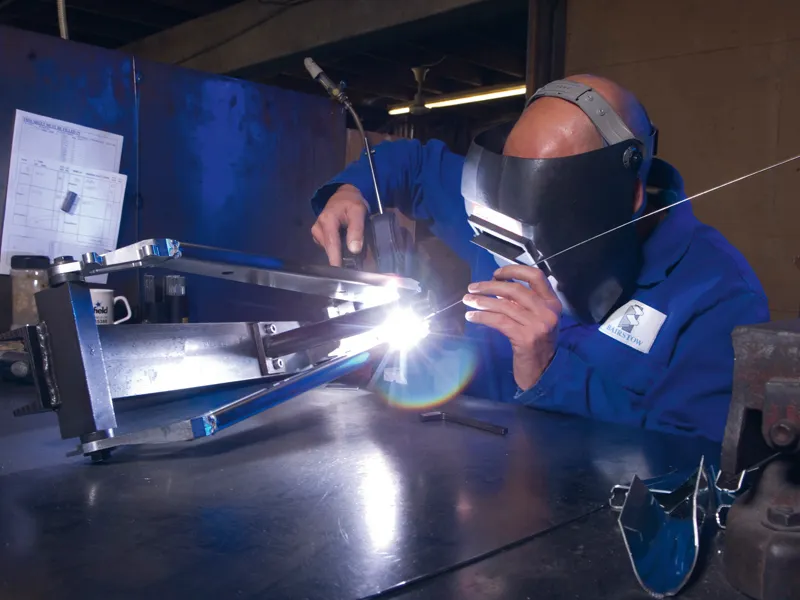
Lester didn't follow his father to the engineering works, but ended up in the Orange factory
How good did you get at mountain biking?
Never that good. I was fit, but shortly afterwards came David Baker and Tim Gould and they were at another level of fitness altogether. At that time I believe they could have pushed Ned Overend at world level.
Did you find that demoralising?
I found it inspiring actually, and it didn’t bother me because for me, racing was the torture of seven deaths. I’d tire and come back and tire – no matter how well I did it was always super hard for me. I very much liked riding bikes, but not racing them.
So I did this one race, Carlton Reid came second to me and he was the man putting together the sponsorship for the Great Britain team. He wanted me because, being a windsurfing champion, I was good for sponsors and media hype. So the Worlds were my second race.
How did Tushingham bikes happen?
I started designing bikes because Muddy Fox had turned their range into an urban fashion item and we were only interested in riding off-road. We sourced them from Taiwan and called them Tushingham bikes.
Then everything changed. Windsurfing went flat and Roger went off to do an Olympic sailing campaign so I met up with Steve (Wade) and we agreed to start our own range of bikes. With his engineering background and sheet metal work business it was the perfect combination.
It was easy for us to assemble and make bikes in house, so instead of bringing in a box (where bikes come readymade) we brought in frames and assembled them ourselves. Then we started doing more manufacturing ourselves.
Did Orange become what it is now with no disasters on the way?
No disasters, no, it was tight to start with, but every year on had been good. We do OK. We’re not exactly rich but we do get to ride a lot.
If at the beginning you’d looked ahead and seen this, would you have been pleased with the way it’s worked out?
Yes, I think so. I’m quite positive in my outlook and I don’t look back on anything in my life with regret. I love the biking and with all these new trails that are opening up I can’t get over how much we get out of it! It’s perfect for our sport. I know lots of people who buy bikes and they’ve never done a natural trail.
It sounds as if you feel fulfilled...
Yeah I think so. Mind, I’m one of those people who have come from a family that was poor so I’m never entirely comfortable. I’m always a bit scared of what can happen when it goes wrong. People think I’m relaxed but inside there’s always a bit of a turmoil.
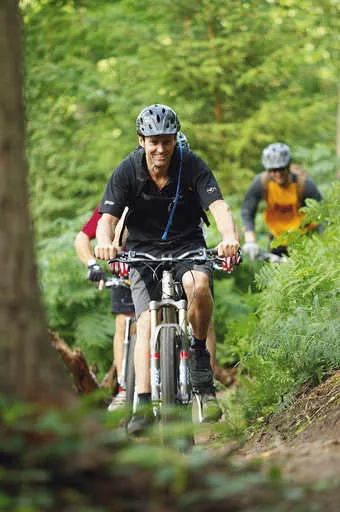
Lester's business partner, Steve Wade
